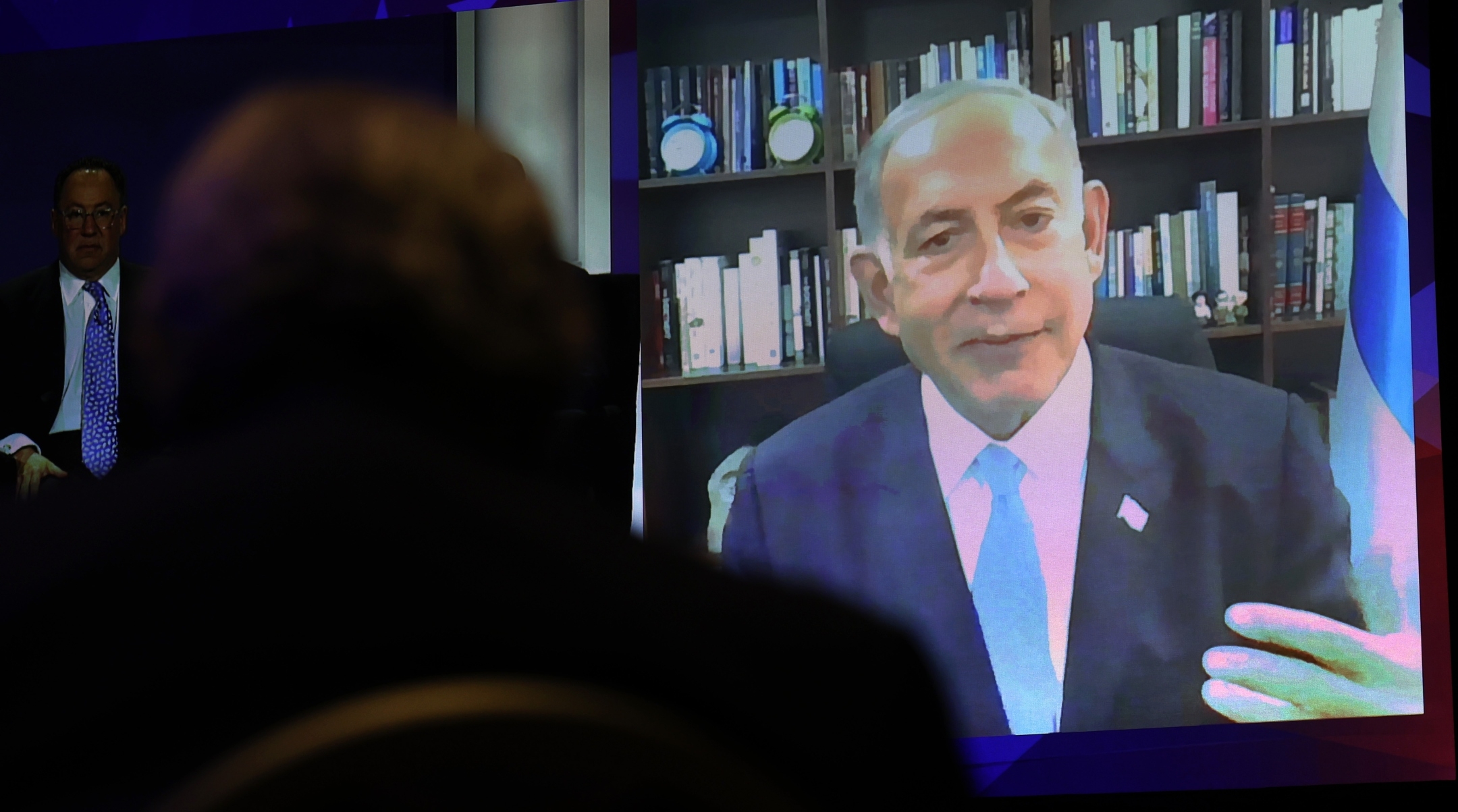Netanyahu to Republican Jews: My controversial 2015 speech in Congress led to Abraham Accords
Netanyahu’s 2015 speech helped bring about a rupture between the once and future Israeli prime minister and Democrats

Former Israeli Prime Minister Benjamin Netanyahu speaks via video link to guests attending the Republican Jewish Coalition annual leadership meeting in Las Vegas, Nov. 19, 2022. (Scott Olson/Getty Images)
LAS VEGAS (JTA) — Benjamin Netanyahu’s acceptance of a Republican invitation to speak to Congress in 2015 to decry the Obama administration’s Iran policy notoriously helped bring about a rupture between the once and future Israeli prime minister and Democrats.
Now Netanyahu says the decision helped cement secret ties with Arab countries that led five years later to the Abraham Accords, the 2020 agreements brokered by the Trump administration that normalized ties between Israel and four Arab countries
“We got phone calls in real time from Gulf States, who were saying we cannot believe what your prime minister is doing, and he’s facing, admittedly, a great leader, the most powerful man in the world, the American president, but if he’s willing to do that, we’d like to cement the ties a lot further, and that led to the secret meetings. between myself in 2015 and Gulf leaders,” Netanyahu said Saturday. “That led to the laying the foundations for the Abraham Accords.”
Netanyahu was speaking about the benefits of one speech seemed designed to inflame partisan tensions in the United States during another talk to a partisan U.S. audience, addressing the annual Republican Jewish Coalition conference. His speech, delivered via video from Israel, made him the first Israeli prime minister, elected or otherwise, to address a partisan Jewish group in the United States.
Netanyahu said he could not describe the contacts from the Gulf States further. Jared Kushner, Donald Trump’s son-in-law and special advisor, wrote in his book that Netanyahu came close to derailing the deals multiple times.
Netanyahu relayed his story to the RJC conference after the group’s chairman, Norm Coleman, asked him why he agreed to accept the invitation to speak in Congress knowing that the decision was not coordinated with the White House.
The Republican speaker of the U.S. House of Representatives in 2015, John Boehner, who invited Netanyahu, broke protocol by keeping the invitation secret until the last minute from the White House and from Democrats in Congress. Netanyahu and his ambassador to Washington, Ron Dermer, agreed to keep the secret until Boehner issued the formal invitation.
Keeping Boehner’s secret led to a perception among Democrats that Netanyahu was playing partisan politics and was a major factor in Democratic disaffection with Netanyahu, from which he has never fully recovered. The Israeli government that ended Netanyahu’s 12-year stint in office last year, led by Naftali Bennet and Yair Lapid, had as a central platform repairing ties with Democrats. Netanyahu was reelected in Nov. 1 elections and will soon form a government.
Netanyahu told the RJC it was a difficult decision. “I can assure you that wasn’t a simple decision to go to the joint session of Congress and challenge the the policy of a sitting president, whom I respected but I disagree with,” he said. He said the Iran nuclear deal President Barack Obama was negotiating endangered Israel. The deal cleared Congress despite Netanyahu’s speech.
“I made that decision because I believe that … this agreement endangered the very existence of the State of Israel,” he said.
Netanyahu said he was relieved when Obama’s successor, Trump, pulled the United States out of the deal in 2018. “I was tremendously fortunate to have finally an American administration under President Trump who agreed with this policy,” Netanyahu said.
Netanyahu said in the talk that he was close to President Joe Biden, saying that they had “an easy relationship, a friendship” dating back to 1982 when Netanyahu was deputy chief of mission at the Israeli embassy in Washington and Biden was a senator from Delaware. He also praised Obama for setting U.S. defense assistance at $3.8 billion a year.
This article originally appeared on JTA.org.
A message from our CEO & publisher Rachel Fishman Feddersen
I hope you appreciated this article. Before you go, I’d like to ask you to please support the Forward’s award-winning, nonprofit journalism during this critical time.
We’ve set a goal to raise $260,000 by December 31. That’s an ambitious goal, but one that will give us the resources we need to invest in the high quality news, opinion, analysis and cultural coverage that isn’t available anywhere else.
If you feel inspired to make an impact, now is the time to give something back. Join us as a member at your most generous level.
— Rachel Fishman Feddersen, Publisher and CEO